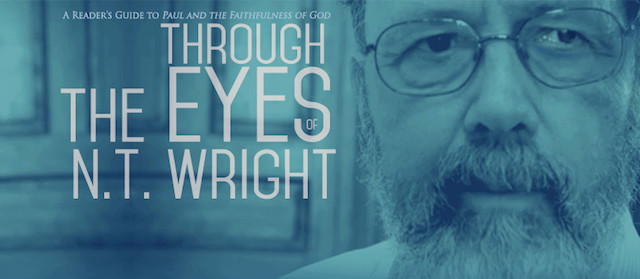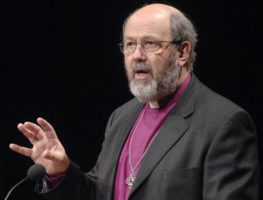I have a new book out this week, Through the Eyes of N.T. Wright. It is a 100-page reader's guide to Wright's big book on Paul. I was happy Missio Alliance wanted to interview me about this exciting new project. Here is the conversation:
Missio: Why did you write this book?
Derek: I have been a big fan of N.T. Wright for a number of years. Like many evangelicals who had inherited bad eschatology, I was really helped by his book Surprised by Hope, and the more I read his books, the more I felt him setting the church on on stable theological footing. I read almost all of Paul and the Faithfulness of God, his massive two-volume work on Paul over a four-month period and then taught the book as a class for members of my church last Fall. I called the class “N.T. Wright and the Faithfulness of Paul.” To my utter surprise, 15 people or so came week after week to listen to me lecture on Wright’s renewed vision of Paul’s theology. I made a five-page outline for each of the classes, which I posted on my blog. I had a number of people outside our church asking for the notes, so I thought I’d edit my notes and put them into one PDF and email it to those who were asking. I knew so many of the pastors and church people who most needed to read Paul and the Faithfulness of God would have difficulty plowing through 1,700 pages of dense theology. I figured my notes would help. When I finished the final edit I realized that as an expanded outline it was 22,000 words. With another round of editing, I knew I would have 100 pages or so of a reader’s guide that would help people catch the key concepts of Paul’s theology that Wright was trying to bring to the surface.
Missio: It seems like a lot of people wanted to read Paul and the Faithfulness of God but didn't actually get through it all?
Derek: Yeah that was my feeling as I was writing my reader's guide and now that the book is getting out there my sucipion is confirmed. Here is just some of the feedback I have been getting the last couple of days:
"I bought the book on Paul the week it can out and made it probably less than 80 pages. It's so dauntingly huge to think about continuing."
"I started reading Paul and the Faithfulness of God about 18 months ago and ran out of steam about one-third of the way in. Now it sits on the side of my desk looking at me accusingly. I will add this timely work by Vreeland to my wishlist!"
"I pre-ordered Paul and the Faithfulness of God so I could dive in as soon as it was released. And dive in I did! That first bit on Philemon was profound and accessible. I learned worthwhile things and received great takeaways. Then I paused and picked up another book. And another. So there N.T. Wright sits on my shelf, gathering the dust of my good intentions. Good news! Derek Vreeland to the rescue!'"
I am happy that my book will help people capture what N.T. Wright is saying in his book about the Apostle Paul.
Missio: It sounds like Through the Eyes of N.T. Wright is a book about a book about a book?
Derek: That is one way to look at it. My book is focused on Paul’s theology "through the eyes of N.T. Wright." Really good scholarship requires interaction with primary sources. The primary source here is Paul’s letters (his books) in the New Testament. The best way to engage in Paul’s theology is to read his letters in Greek and then begin to weigh the merits of the interpretation of other scholars, a difficult task for most of us. The good news is Wright has done that for us. So the next best thing to working through Paul’s letters in Greek is to work through scholarly work that has been working through the primary source material. My book is to help people work through one scholarly book that has done just that.
Missio: Has N.T. Wright seen your book?
Derek: Yes! I emailed him a PDF copy of the book not knowing if he would respond and he did! He was extremely gracious, thanking me and congratulating me on “ably summarizing” his book. He did offer some points of clarity, even pointing out a typo in a footnote! He only had a chance to scan over the manuscript briefly. He said he would like to send me a longer reply soon. Getting an email reply back from N.T. Wright ("Tom" as he wrote in his email) ranks up there as one of the greatest days of my life. I consider him to be a hero; he is a rock star in the world of the theology. Getting an email from him was like getting an email from Bono.
Missio: What do you want people to take away from reading your book?
Derek: A love for God, for the church, and for a theology rooted in the teachings of the Apostle Paul. One of the reason I love N.T. Wright is that he loves the church. He has spent his life in two worlds—the church world and the world of the academy. In reading Paul of the Faithfulness of God, I was convinced without a doubt that Wright has done his best academic work for the church. In writing this little book, I see myself as helping him spread the message of his book to the wider church. I want people to catch Wright's assessment of Paul’s theology so their own faith will grow and their love for the church will increase. Paul wrote letters to help the church think Christianly. Wright’s renewed vision of Paul’s theology is for the members of God’s church to experience a renewal of the mind.
Missio: What do you mean by a “renewed vision” of Paul’s theology?
Derek: I hesitate to call Wright’s interpretation of Paul “new.” I spend some time in Chapter 1 describing the differences between the “Old Perspective” and “New Perspective” on Paul, but Wright does not like those categories or titles. In fact, in his email to me he said while he understood why I charted some of the basic difference between the “perspectives” on Paul, he wished I wouldn’t have laid it out that way. He doesn’t really like pushing these theological issues into either/or categories. To call Wright’s work “new,” or a representation of the “new perspective,” is a bit of a misnomer. For one, the work of Sanders, Dunn, Wright, and others seems new in that it is newer than reformed interpretations of Paul’s theology, particularly on the subject of justification. Wright, and others, would argue that their position is older, predating the interpretation of the 16th century Protestant reformers. So Wright’s vision of Paul’s theology is not new as if it were a theological novelty, rather it is renewed as it has recovered Paul in the light of his Jewish context without all the cultural layers laid upon him during the 16th century. Also there is no such thing as one unified “new perspective,’ there are many new perspectives with subtle differences.
Missio: For N.T. Wright, what is at the heart of Paul’s theology?
Derek: Wright makes the claim that Paul created what we know as Christian theology. While all of the writers of the New Testament had a theological point of view, Paul was the first of the apostles to begin to lay the groundwork for what we know as Christian theology built squarely on, but separate from, a Jewish understanding of God and his world. For Wright, Paul’s theology is about God, God’s people, and God’s future, that is monotheism, election, and eschatology. These are Jewish concepts which Paul rethought, redefined, and reimagined in the light of Jesus and the coming of the Holy Spirit. The strength of Wright’s interpretation of Paul is he takes a step back to piece together Paul’s worldview by looking at Paul’s historical context. All other points of doctine find their home within these primary catagories. For example, the doctrine of sin or the doctrine of justification by faith are not at the heart of Paul's theology, but are rather subsets of these other theological catagories.
Missio: How is worldview different than theology?
Derek: Wright says worldview and theology go together in a “chicken-and-egg sort of way,” meaning it is hard to determine which one comes first, because they are so interrelated. Worldview is one’s perspective or point of view. It is a way of looking at the world. Theology is what a person thinks and says about God and God's world based on opinions they have formed from things they have observed. In other words, worldview is not what they are looking at it is what they are looking through. A worldview is like a pair of eyeglasses and if you want to look at, and understand Paul’s theology, you have to read Paul’s letters through the lense of Paul’s worldview. You have to put on Paul’s glasses in order to understand what Paul meant when he wrote what he did. One of the common mistakes modern Americans make in understanding Paul is they read his letters through an modern individualistic worldview which is prevalent in contemporary American culture. We have a worldview shaped by the elevation of the individual, the autonomous thinking self. Paul’s worldview was constructed with a community-centeredness. In many of his letter’s when Paul was writing to “you” he was using the third person plural pronoun “you all,” writing to the entire community, not isolated individuals. Reading Paul’s letters to understand his theology requires putting on his worldview.
Missio: What aspect of Wright’s renewed vision of Paul’s theology has been helpful for you?
Derek: My initial response is his eschatology. Understanding that ethics flows out of eschatology, that the Holy Spirit is forming us now to be people fit for the age to come has been helpful for me in making disciples of the Jesus way. What we do now matters, because it is connected not to this temporary evil age, but the age that is to come. However, I learned rethought a lot of my eschatology after reading Surprised by Hope. The stand out take-away for me after writting this reader's guide is a clearer picture of election. Paul uses the language of election, according to Wright, not to talk about salvation but vocation.
I grew up in Christ in an Arminian, Wesleyan, Pentecostal/charismatic theological perspective. As I began to explore theological traditions outside of what I knew, I began to see the value and point of view of the reformed and Calvinistic traditions. Early on for me, it seemed that their interpretation of election as God’s act of choosing some people for salvation fit in the grand scheme of the biblical narrative, but pursuing the logical conclusions of predestination and other themes always led to problems for me. I tried to avoid the problems, chalking them up to the “mystery of God,” because it seemed like the Calvinists were at least dealing with election in a way that seemed more honest with the text than the Arminians. Then Wright helped me see the language of election in Paul’s native Jewish context and the light bulb went off for me. In Romans, Paul was not using the language of election to demonstrate how God saves the world by electing some and damning others. Rather, Paul uses the language of election to show that God’s single plan to save the whole world through choosing Israel has been expanded to include Gentiles too. The chosen people of God (the elect) are now Jews and Gentiles working together to carry forth the mission of God on the earth. Jewish election was not about God saving one people, making them his best friends, and sending the rest of the nations to hell. Jewish election was about God choosing one nation to bless all the families of the earth. And this interpretation of election fits perfectly into the grand arc of the biblical narrative.
Missio: How can the church be strengthened by reading this book?
Derek: In reading my reader’s guide, you will quickly see the recurring theme throughout Wright’s book is faithfulness. The God of Israel, who is the God of creation, the Creator of us all, has been faithful to his promises to Israel. He promised to come again and rule and reign and dwell once again in his temple. He has demonstrated his faithful to his covenant with Israel through the faithfulness of Jesus the Messiah. The coming of Jesus and the outpouring of the Spirit has caused us to rethink what it means for God to be one and for God's people to be one, but nevertheless God has been faithful and will continue to be faithful to the church, the redefined people of God as we carry out the mission to reflect his glory into all creation and reflect back the praise of creation to him. God has not abandoned us and he has not given up on his good creation. He desires to work through us in redeeming and restoring his world to resemble a new creation, where everything becomes new. This vision of church life is much more exciting to me than merely signing up people for a pleasurable afterlife. This vision of God, God’s people, and God’s future has everything to do with love and beauty and justice and community and all the things that make us fully human. This vision comes to us through the writings of Paul. At a time when it seems like a number of people are running to the words of Jesus and ignoring the words of Paul, my book and Wright's work in this area can help the church to recognize the value of the teaching and influence of Paul the Apostle. We do, after all, confess our belief in a church that is one, holy, catholic, and apostolic. To be "apostolic" in the truest sense is to be under the teaching and guidance of the apostles.







Missio Alliance Comment Policy
The Missio Alliance Writing Collectives exist as a ministry of writing to resource theological practitioners for mission. From our Leading Voices to our regular Writing Team and those invited to publish with us as Community Voices, we are creating a space for thoughtful engagement of critical issues and questions facing the North American Church in God’s mission. This sort of thoughtful engagement is something that we seek to engender not only in our publishing, but in conversations that unfold as a result in the comment section of our articles.
Unfortunately, because of the relational distance introduced by online communication, “thoughtful engagement” and “comment sections” seldom go hand in hand. At the same time, censorship of comments by those who disagree with points made by authors, whose anger or limited perspective taints their words, or who simply feel the need to express their own opinion on a topic without any meaningful engagement with the article or comment in question can mask an important window into the true state of Christian discourse. As such, Missio Alliance sets forth the following suggestions for those who wish to engage in conversation around our writing:
1. Seek to understand the author’s intent.
If you disagree with something the an author said, consider framing your response as, “I hear you as saying _________. Am I understanding you correctly? If so, here’s why I disagree. _____________.
2. Seek to make your own voice heard.
We deeply desire and value the voice and perspective of our readers. However you may react to an article we publish or a fellow commenter, we encourage you to set forth that reaction is the most constructive way possible. Use your voice and perspective to move conversation forward rather than shut it down.
3. Share your story.
One of our favorite tenants is that “an enemy is someone whose story we haven’t heard.” Very often disagreements and rants are the result of people talking past rather than to one another. Everyone’s perspective is intimately bound up with their own stories – their contexts and experiences. We encourage you to couch your comments in whatever aspect of your own story might help others understand where you are coming from.
In view of those suggestions for shaping conversation on our site and in an effort to curate a hospitable space of open conversation, Missio Alliance may delete comments and/or ban users who show no regard for constructive engagement, especially those whose comments are easily construed as trolling, threatening, or abusive.